 W
WJoe Randolph "J. R." Ackerley was a British writer and editor. Starting with the BBC the year after its founding in 1927, he was promoted to literary editor of The Listener, its weekly magazine, where he served for more than two decades. He published many emerging poets and writers who became influential in Great Britain. He was openly homosexual, a rarity in his time when homosexual activity was forbidden by law and socially ostracized.
 W
WCharles Douglas Armstrong was a British Army officer in World War I and World War II who reached the rank of brigadier. During World War II, from July 1943 to early 1944, he was the head of the British Special Operations Executive (SOE) Liaison Mission to the Chetnik forces of Draža Mihailović in Yugoslavia.
 W
WFrederick Montagu Arnold was an English rower, school teacher, officer in the volunteers and clergyman.
 W
WLieutenant General Michael George Henry Barker was a British Army officer who fought in both world wars, notably as commander of I Corps during the Battle of France in May 1940.
 W
WColonel Francis Marcus Beresford was a British Conservative Party politician
 W
WSir Hugh Charles Philip Bidwell was a British businessman and the 662nd Lord Mayor of London in 1989–90. Prior to his election as mayor Bidwell was an alderman of the Billingsgate ward from 1979 to 1996, and a sheriff of the City of London in 1986. Bidwell was appointed a Knight Grand Cross of the Order of the British Empire (GBE) on his election as mayor.
 W
WHarry Cator VC, MM was an English recipient of the Victoria Cross, the highest and most prestigious award for gallantry in the face of the enemy that can be awarded to British and Commonwealth forces.
 W
WGeorge Hanger, 4th Baron Coleraine was a British soldier, author, and eccentric.
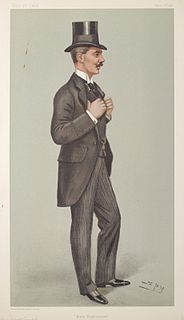 W
WLord Alwyne Frederick Compton, DSO, DL was a British Army officer who became a Liberal Unionist and then Unionist politician.
 W
WSir Hew Dalrymple, 3rd Baronet was the Member of Parliament (MP) for Haddingtonshire 1780–1786.
 W
WLieutenant-General Sir Arthur Arnhold Bullick Dowler KCB KBE DL was a senior British Army officer who was General Officer Commanding (GOC) East Africa Command.
 W
WPatrick Ferguson was a Scottish officer in the British Army, an early advocate of light infantry and the designer of the Ferguson rifle. He is best known for his service in the 1780 military campaign of Charles Cornwallis during the American Revolutionary War in the Carolinas, in which he played a great effort in recruiting American Loyalists to serve in his militia against the Patriots.
 W
WAir Commodore James Lloyd Findlay was a New Zealand soldier and air force officer who served in both World Wars.
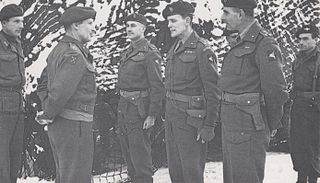 W
WBrigadier Edwin William Conquest Flavell DSO, MC & Two Bars was a British Army officer who served in both World War I and World War II. He served with great distinction during the latter, where he commanded the 1st Parachute Brigade in North Africa and the 6th Airlanding Brigade in Normandy, before becoming Deputy Chief of Staff HQ First Allied Airborne Army.
 W
WMajor Arthur James Terence Fleming-Sandes was an English recipient of the Victoria Cross, the highest and most prestigious award for gallantry in the face of the enemy that can be awarded to British and Commonwealth forces.
 W
WGeneral Sir Richard Foster Carter Foster, was a Royal Marines officer who served as Adjutant-General Royal Marines and later as colonel of the East Surrey Regiment.
 W
WGilbert Frankau was a popular British novelist. He was known also for verse, including a number of verse novels, and short stories. He was born in London into a Jewish family but was baptised as an Anglican at the age of 13. After education at Eton College, he went into the family cigar business and became Managing Director on his twenty-first birthday, his father, Arthur Frankau, having died in November 1904. A few months before his death, at sixty-eight, from lung cancer, he converted to Roman Catholicism.
 W
WMajor Benjamin Handley Geary VC was a British Army recipient of the Victoria Cross, the highest and most prestigious award for gallantry in the face of the enemy that can be awarded to British and Commonwealth forces.
 W
WWalter Richard Pollock Hamilton VC was born in Inistioge, County Kilkenny and was an Irish recipient of the Victoria Cross, the highest and most prestigious award for gallantry in the face of the enemy that can be awarded to British and Commonwealth forces. He is featured in M. M. Kaye's epic novel The Far Pavilions.
 W
WLieutenant General William Hargrave was a British Army officer and Governor of Gibraltar.
 W
WLieutenant-Colonel Thomas Huxley was a British Army officer who fought in the Second Carib War, survived the ship wreck of HMS Dromedary; and took part in the British attack on Danish West Indies. When he was part of the 70th Regiment, he married Jessie Scott, the niece of Sir Walter Scott. He later became the Military Secretary to Lord Dalhousie, the Governor General of British North America. He is buried in the Old Burying Ground.
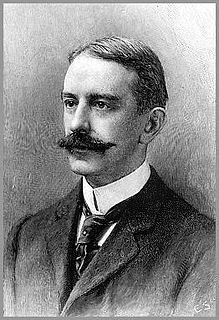 W
WFrederick George Jackson was an English Arctic explorer remembered for his expedition to Franz Josef Land, when he located the missing Norwegian explorer Fridtjof Nansen.
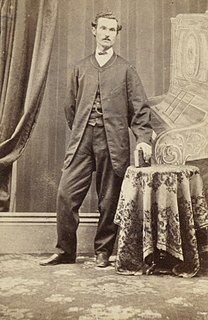 W
WJohn King was an Irish soldier who achieved fame as an Australian explorer. He was the sole survivor of the four men from the ill-fated Burke and Wills expedition who reached the Gulf of Carpentaria. The expedition was the first to cross Australia from south to north, finding a route across the continent from Melbourne in Victoria to the Gulf of Carpentaria in Queensland.
 W
WMajor General Sir John Raynsford Longley was a British Army officer who reached high command during World War I.
 W
WGeneral Sir Hector Munro, 8th laird of Novar KB was a British soldier who became the ninth Commander-in-Chief of India (1764–1765).
 W
WSir Alexander Henry Paterson MC, known to his friends as Alec Paterson, was a British penologist who, as Commissioner of Prisons, introduced reforms that would provide a humane regime in penal institutions and encourage rehabilitation among inmates. He was the main force behind the development of Borstals and gained an international reputation as a great prison reformer.
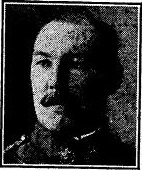 W
WRobert Francis Peel was an English soldier, Conservative politician and Governor of Saint Helena from 1920 until his death in 1924.
 W
WBrigadier George Rowland Patrick Roupell was born in Tipperary and was an Irish born recipient of the Victoria Cross, the highest and most prestigious award for gallantry in the face of the enemy that can be awarded to British and Commonwealth forces.
 W
WRaymond Ladais Sandover, was a brigadier in the Australian Army. During the Second World War, he commanded the 2/11th Battalion from 1941 to 1943 and the 6th Australian Infantry Brigade between 1943 and 1945.
 W
WSir John Anthony Holt Saunders, CBE, DSO, MC was chairman of The Hongkong and Shanghai Banking Corporation, at a time of rapid and turbulent development of the Hong Kong economy. In his banking career, as chief manager from 1962, and chairman from 1964 to 1972, Saunders was at the helm of Hong Kong's most important financial institution at a time when the Crown Colony was rapidly changing from a trading post to a regional centre of manufacturing and finance.
 W
WRobert Cedric Sherriff, FSA, FRSL was an English writer best known for his play Journey's End, which was based on his experiences as an army officer in the First World War. He wrote several plays, novels, and screenplays, and was nominated for an Academy Award and two BAFTA awards.
 W
WMajor-General James Stuart was a British Army officer who served in various colonial wars of the 18th century. His service of the British East India Company was marked by his conflict with Lord Pigot, the governor of Madras; Stuart's arrest of the latter in 1776 resulted in his suspension as commander-in-chief, and he was not vindicated until 1780. He later fought in the Second Anglo-Mysore War, but was suspended from command in 1782 by Lord Macartney, an action that provoked a duel between the two men. Stuart was a younger brother of the lawyer and politician Andrew Stuart.
 W
WGeneral John Howard, 15th Earl of Suffolk, 8th Earl of Berkshire, FSA was a British soldier and nobleman.
 W
WFrancis Alfred Suttill DSO, code name Prosper, was an agent of the United Kingdom's clandestine Special Operations Executive (SOE) organization in World War II. Suttill was the creator and organiser (leader) of the Physician or Prosper network in and around Paris, France from October 1942 until June 1943. The purpose of SOE was to conduct espionage, sabotage and reconnaissance in occupied Europe and Asia against the Axis powers, especially Nazi Germany. SOE agents allied themselves with French Resistance groups and supplied them with weapons and equipment parachuted in from England.
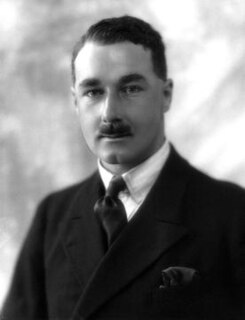 W
WMajor-General Lechmere Cay Thomas was a senior British Army officer who fought in both the First and Second World Wars.
 W
WSir Harry Verney, 2nd Baronet PC, DL, JP was an English soldier and Liberal politician who sat in the House of Commons variously between 1832 and 1885.
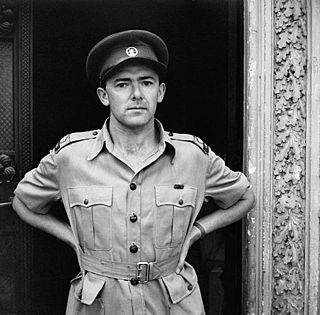 W
WLieutenant Colonel Eric Charles Twelves Wilson VC was an English British Army officer and colonial administrator. He received the Victoria Cross, the highest and most prestigious award for gallantry in the face of the enemy that can be awarded to British and Commonwealth forces. At the time of his death, he was last surviving British Army recipient of the Victoria Cross in the Second World War, and the earliest and oldest recipient.